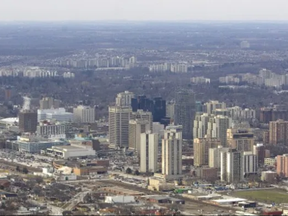
Article content
London’s economy roared back from the pandemic last year, its growth outpacing other major Southwestern Ontario cities, and it is expected to put in another solid performance this year, a major economic think-tank says.
Advertisement 2
Article content
The Conference Board of Canada is projecting the London economy will grow 3.8 per cent this year, matching the provincial growth rate, before slowing somewhat to 1.8 per cent in 2023.
The projected decline next year, however, is not concerning given how strong the economy performed even as the country battled COVID-19, said Richard Forbes, an economist with the Conference Board of Canada.
“London, over the past two years, has been extremely resilient compared to a lot of cities,” he said.
“I would call it a very bright outlook.”
The London region’s economy, for example, grew at an impressive 6.7 per cent in 2021, according to the board. That compares to Hamilton’s four per cent, Kitchener-Waterloo’s 5.6 per cent and the St. Catharines-Niagara region’s 4.9 per cent.
Advertisement 3
Article content
“Just because it’s weaker (in 2023) is not a reflection of a weakness in the city’s economy. A lot of that is actually just because London did so well that we think, naturally, some of the steam will fade,” said Forbes, who wrote the London-area report.
Sectors such as financial services and health care did well in London during the pandemic while the housing market boomed during the past two years, helping the city’s strong showing, he said.
As high as home prices have risen – reaching a record average selling price of $825,000 in February – London also has benefited from its relative affordability compared to communities closer to the Greater Toronto Area and the work-from-home phenomenon, both of which made London a desirable destination.
Advertisement 4
Article content
“Because of the rise of remote work, a lot of folks were able to relocate but still work for their employers in the GTA because they didn’t have to go to the office every day,” Forbes said.
“That really benefited the local economy quite a bit.”
As COVID-19 pandemic restrictions are lifted and more employees return to their offices, Forbes anticipates a bit of a reversal of that trend, saying, “You’ll probably see consumers be less confident in their ability to work remotely permanently.”
That may lead to a cooldown of the housing market, which was hot even before the pandemic hit and it’s still expected to remain strong.
But the exodus of workers won’t happen overnight and not everyone who came to London will move back either, Forbes added, saying London will continue to see strong immigration numbers.
Advertisement 5
Article content
“We’ll see people start to go back to the offices more frequently . . . but we think remote work is here to stay,” he said.
“So, that will continue to be a key driver for the London economy over the next few months and several years.”
Excluding the disruption the pandemic caused in the service, retail and tourism sectors, the London economy held its own throughout the pandemic.
The London region, for instance, lost more than 30,000 jobs after the virus’s first wave. The economy not only has recouped all those jobs, it has added almost 23,000 positions on top of that and last month, hit its lowest unemployment rate in two years at 5.3 per cent.
Even those hard-hit sectors are expected to rebound in both 2022 and 2023.
“Students returning to classes at Western and Fanshawe, that’s a big hit,” Forbes said. “I think the outlook for industries like restaurants and the hospitality sector is pretty bright.”
Advertisement 6
Article content
Though the pandemic continues to wreak havoc across the world, its impact on the economy is expected to be less pronounced going forward, Forbes said, calling widespread lockdowns and restrictions “history at this point.”
More concerning could be the impact of the virus on global supply chains and its effect on prices, with inflation at a rate not seen in Canada in decades.
“The biggest impact of the pandemic we see going forward is actually through inflation because supply chains have been battered so badly over the last couple of years,” he said.
“Inflation is a big issue for consumers, but also on the business side in terms of investment in the city.”
Twitter.com/JuhaatLFPress
Advertisement
Here we grow again: London's economy to continue roll, think-tank says - The London Free Press
Read More
No comments:
Post a Comment